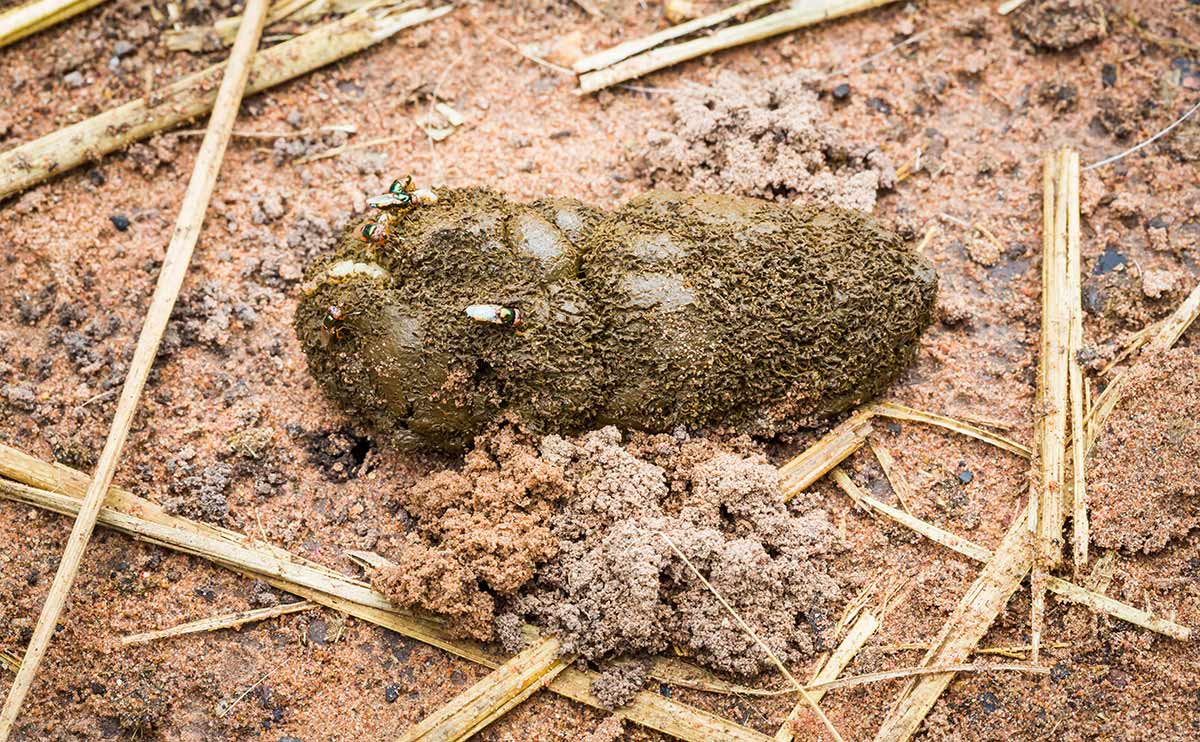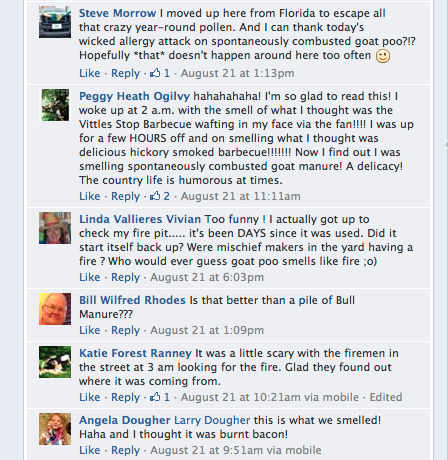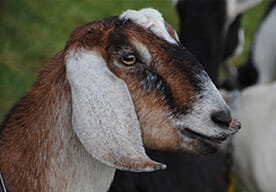Goat Manure Spontaneous Combustion: It’s A Thing
On the curious incident that stunk up a Vermont town.
Goat Manure Spontaneous Combustion: It’s A Thing
On the curious incident that stunk up a Vermont town.

It all started with a 3 a.m. visit to a goat barn.
In the pre-dawn hours of August 22, an employee of Oak Knoll Dairy farm stopped by to check on one of a handful of structures holding the farm’s 800 goats. This particular barn was filled with pregnant goats and kids, and happened to be next to a concrete building stacked high with manure. Dealing with the ever-growing piles of manure is obviously a design challenge for any goat farmer and Windsor’s partial-solution was to house the stuff in a little outhouse slightly downhill from the birthing barn. Inside the concrete building, though, the goat manure kept rising, up to its 20-foot-tall ceilings, taking up around 120 cubic feet of space.
But the farm worker didn’t smell goat dung – she smelled smoke. She woke up farm owners George Redick and Linda Renbo, his wife, and the blaze got hosed down. The Fire Department also came to inspect. Soon, residents all over the Vermont hamlet were talking about the peculiar smell. The incident made international news, as people took to Facebook to complain bitterly about the noxious odors. The town manager likened it to “a damp kind of burning leaves or brush fire” (it “wasn’t like a whiff” either) while another townsman said it smelled like bacon.”Because there was no wind, and because there was a foggy morning, it just permeated the town,” said Redick, before adding, “certainly not as bad as green cow manure in the spring.”
Redick’s first reaction, though, was “oh no, not this again.” Welcome to one of the strangest hazards of working with farm animals: spontaneous manure combustion.

Typically one hears about spontaneous combustion in terms of “spontaneous human combustion,” which, according to to fire expert Angelo Pisani, is a myth (“you know that, right?”) But spontaneous combustion itself is very real, and can have multiple causes. In the case of the goat manure, it’s a bacterial thing: the bacteria in the animal droppings multiply, create heat, and in the pile, it gets hotter and hotter. Get some oxygen in the mix and it can ignite. Eventually, smoke starts seeping out. “Every fuel has a different ignition,” says Pisani, guessing that goat manure would be between 200-300 degrees. While this kind of fire is rare in cities, Pisani says it’s “fairly common” in farmland. “If people don’t pay attention to how they are storing [manure], it combusts,” he says, noting that another common spontaneous combustion occurs in manufacturing, with lynseed oil. When people leave rags with that oil in a pile, they can start a fire. (Fun fact: if you leave cloth with olive oil in a dryer for too long, that can also spontaneously combust.)

Good statistics on incidence of manure’s fire-starting capibilities are hard to come by, although some huge fires have come from sitting dung. In 2007, for instance, a 200-acre California blaze got started from manure and in 2009, manure sparked another California fire, this time encompassing over 6,000 acres in Ventura County. Far more common, though, according to Redick, are small piles that emit smoke and are quickly put out. In his experience, manure spontaneous combustion is a bit of a joke – the kind of thing a farmer would claim if he accidentally burned down a barn because of some other, more human error. “To be honest, it happened a year before as well,” he said, referring to a fire in the concrete building, “and didn’t bother any one.” He termed the fire department’s decision to put it out a “political” choice, since last year, they just let the fire burn out itself.
Not that Redick really minds the attention his goat manure fire has brought his farm. In addition to giving interviews to everyone from the local paper to the Associated Press, Redick proudly recounted being an answer on a recent episode of NPR’s “Wait, Wait… Don’t Tell Me!” “We make goat milk and yogurt but we can’t afford advertisements. As my sister’s boyfriend said, ‘You should milk this for all its worth,'” the goat farmer said, laughing.
Still, though, some changes have been made. The concrete manure shed has been dug out, excavated. It took more than a week to put out all the little goat dung spontaneous fires.
An earlier version of the story misidentified the name of the goat farm.
Follow us
This work is licensed under a Creative Commons Attribution-NoDerivatives 4.0 International License.
Want to republish a Modern Farmer story?
We are happy for Modern Farmer stories to be shared, and encourage you to republish our articles for your audience. When doing so, we ask that you follow these guidelines:
Please credit us and our writers
For the author byline, please use “Author Name, Modern Farmer.” At the top of our stories, if on the web, please include this text and link: “This story was originally published by Modern Farmer.”
Please make sure to include a link back to either our home page or the article URL.
At the bottom of the story, please include the following text:
“Modern Farmer is a nonprofit initiative dedicated to raising awareness and catalyzing action at the intersection of food, agriculture, and society. Read more at <link>Modern Farmer</link>.”
Use our widget
We’d like to be able to track our stories, so we ask that if you republish our content, you do so using our widget (located on the left hand side of the article). The HTML code has a built-in tracker that tells us the data and domain where the story was published, as well as view counts.
Check the image requirements
It’s your responsibility to confirm you're licensed to republish images in our articles. Some images, such as those from commercial providers, don't allow their images to be republished without permission or payment. Copyright terms are generally listed in the image caption and attribution. You are welcome to omit our images or substitute with your own. Charts and interactive graphics follow the same rules.
Don’t change too much. Or, ask us first.
Articles must be republished in their entirety. It’s okay to change references to time (“today” to “yesterday”) or location (“Iowa City, IA” to “here”). But please keep everything else the same.
If you feel strongly that a more material edit needs to be made, get in touch with us at [email protected]. We’re happy to discuss it with the original author, but we must have prior approval for changes before publication.
Special cases
Extracts. You may run the first few lines or paragraphs of the article and then say: “Read the full article at Modern Farmer” with a link back to the original article.
Quotes. You may quote authors provided you include a link back to the article URL.
Translations. These require writer approval. To inquire about translation of a Modern Farmer article, contact us at [email protected]
Signed consent / copyright release forms. These are not required, provided you are following these guidelines.
Print. Articles can be republished in print under these same rules, with the exception that you do not need to include the links.
Tag us
When sharing the story on social media, please tag us using the following: - Twitter (@ModFarm) - Facebook (@ModernFarmerMedia) - Instagram (@modfarm)
Use our content respectfully
Modern Farmer is a nonprofit and as such we share our content for free and in good faith in order to reach new audiences. Respectfully,
No selling ads against our stories. It’s okay to put our stories on pages with ads.
Don’t republish our material wholesale, or automatically; you need to select stories to be republished individually.
You have no rights to sell, license, syndicate, or otherwise represent yourself as the authorized owner of our material to any third parties. This means that you cannot actively publish or submit our work for syndication to third party platforms or apps like Apple News or Google News. We understand that publishers cannot fully control when certain third parties automatically summarize or crawl content from publishers’ own sites.
Keep in touch
We want to hear from you if you love Modern Farmer content, have a collaboration idea, or anything else to share. As a nonprofit outlet, we work in service of our community and are always open to comments, feedback, and ideas. Contact us at [email protected].by Reyhan Harmanci, Modern Farmer
September 19, 2013
Modern Farmer Weekly
Solutions Hub
Innovations, ideas and inspiration. Actionable solutions for a resilient food system.
ExploreExplore other topics
Share With Us
We want to hear from Modern Farmer readers who have thoughtful commentary, actionable solutions, or helpful ideas to share.
SubmitNecessary cookies are absolutely essential for the website to function properly. This category only includes cookies that ensures basic functionalities and security features of the website. These cookies do not store any personal information.
Any cookies that may not be particularly necessary for the website to function and are used specifically to collect user personal data via analytics, ads, other embedded contents are termed as non-necessary cookies.